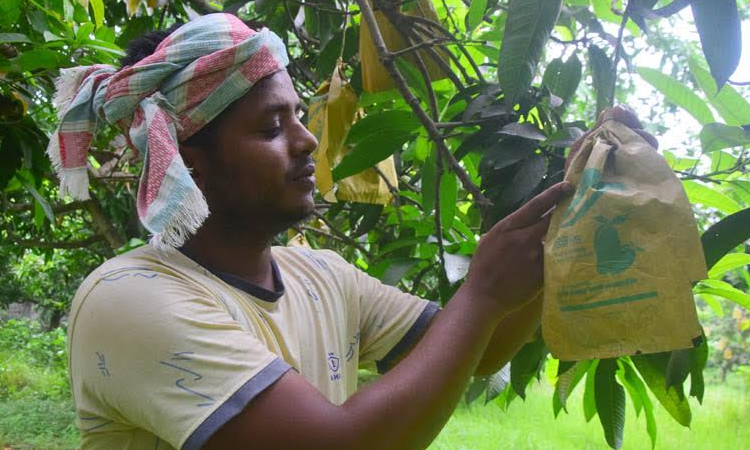News Flash

By Md Aynal Haque
RAJSHAHI, June 22, 2025 (BSS) - Fruit-bagging method has been benefiting mango growers and traders in many ways, particularly protection from pest attack together with making sure the farmers get quality yield and its better price, in the region for the last couple of years.
Fruit bagging, a method of covering mangoes with bags during cultivation, is becoming increasingly popular in Rajshahi to improve mango quality and export potential.
This technique helps protect the mangoes from pests, diseases, and physical damage, resulting in higher-quality, export-worthy fruit. The use of fruit bagging is contributing to the economic growth of Rajshahi by boosting mango exports and farmer income.
Fruit bagging technology is being promoted in mango orchards in Rajshahi, Naogaon and Chapainawabgonj commercially during this pre-harvest season to protect mango from pest attack besides facilitating the farmers to get quality yield.
The method is being applied in growing all mango varieties like Khirshapat, Gopalbhog, Langra, Amrapali, Gauromati, Fazli and Himsagar.
Abul Hossain, a farmer of Premtali village under Godagari upazila, said the fruit bagging method keeps fruits fresh and spot-free. He spent Tk 1,24,800 to purchase the bag for 32,000 mangoes.
At present, only medium and large farms are using fruit bags as small farms remain unable to fund such an expense.
Mango is the leading seasonal cash crop of the country's northwest region and dominates the economy in the region.
Fruit bags are used during April and May, just ahead of the paddy harvest.
According to the Department of Agriculture Extension (DAE) sources, there are about 30.2 lakh mango trees of different ages and varieties on some 34,500 hectares in the region with the creation of many more new mango orchards and increased mango farming in the homesteads in recent years.
If the bags are used substantially, the use of harmful chemical insecticides and pesticides can be reduced to a greater extent on the huge trees. Thus, the technology will open up a new door for exporting mangoes of the three districts famous for the delicious fruit to various foreign markets.
Monzurul Huda, former director of DAE, said the demand for fruit bags in mango farming has been increasing by about 15 million pieces per year.
Scientists of the Regional Horticulture Research Center (RHRC) in Chapainawabganj have released the technology among the growers around seven to eight years back after attaining remarkable success in on-farm research fields.
Already, many private organizations are procuring the specialized bags from abroad for supplying to the farmers at a cost of Tk 3 to 4 per bag.
Referring to his research findings Dr Mukhlesur Rahman, principal scientific officer of RHRC, said that bagged fruits are a high recovery of marketable fruits over the non-bagged ones.
Brown paper bags and local newspapers with lorsban-impregnated plastic strips were also found promising. However, results showed that the highest material and labour cost per 100 fruits was recorded on brown bag materials.
Besides, the materials help reduce insect and disease damage and minimize quality defects of mango fruits. Dr Rahman says pre-harvest fruit bagging is a useful approach for plant protection.
Dr Shafiqul Islam, principal scientific officer of Fruit Research Station in Rajshahi, said mango is one of the commercially important fruit crops in the region, but the important cash crop is prone to attacks of insect pests and diseases in all stages of development.
In this field, the technology has created high hope among the growers and traders towards removing the menace.
One management practice that can help address these problems is fruit bagging because it is another way of preventing contact between the host and insects and diseases as well as minimizing mechanical injuries thus improving quality.
The initiative aimed to determine which of the bagging materials and forms gives the best quality of fruits, determine the effect of the bagging materials and forms on pest incidence and find out which of the bagging materials and forms gives the highest yield and net income.
If the technology is used, there will be no spot-on mango in the bagged ones. Besides, the mango could be protected from all kinds of diseases and pests which will boost the volume of exportable mangoes.
Apart from this, as the market price of the bagged mango is lucrative, the growers can sell their produce at a high price.
Umme Salma, Deputy Director of DAE, said contract farming is increasing day by day, with the use of fruit bagging technology rising for safe mango production. As a result, the production of safe mangoes has increased. Not all mangoes are exported abroad.
In addition, the bags help keep the mangoes dry inside a controlled temperature, which extends the fruit's longevity so that farmers can take them to the market at will.